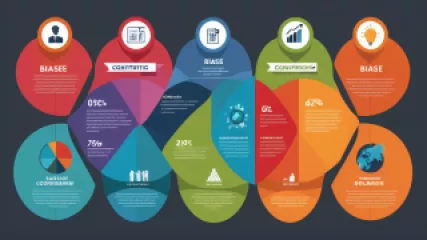Understanding Cognitive Biases: A Research Summary
Introduction:
Cognitive biases are inherent tendencies or patterns of thinking that can cloud our judgment and decision-making processes. These biases often lead us to make irrational choices and judgments, influenced by factors such as emotions, social pressure, and personal beliefs. Understanding cognitive biases is crucial for personal development and effective decision-making. This research summary aims to provide a comprehensive overview of some common cognitive biases, their effects, and strategies to mitigate their impact.
The Availability Heuristic
One widely recognized cognitive bias is the availability heuristic, which refers to the tendency to judge the likelihood of an event based on how easily examples or instances come to mind. This heuristic can lead to inaccurate assessments if we rely solely on easily retrievable information, rather than considering the full range of relevant data.
The availability heuristic can be particularly powerful when vivid or emotionally charged events dominate our thoughts, making them more accessible in our memory. For example, people might overestimate the likelihood of plane crashes after hearing news reports about such incidents, even though statistical data suggests otherwise.
Overcoming the availability heuristic requires a conscious effort to seek out and consider a broader range of information. By engaging in critical thinking and actively seeking diverse perspectives, individuals can reduce the impact of this bias on their decision-making process.
The Overconfidence Effect
Another important cognitive bias is the overconfidence effect, where individuals tend to overestimate their abilities or the accuracy of their judgments. This bias can manifest in various domains, such as academic performance, financial decision-making, and interpersonal relationships.
Research has shown that overconfidence can lead to poor decision-making outcomes, as individuals may take unnecessary risks or fail to adequately prepare for potential challenges. It can also hinder personal growth and development by preventing individuals from recognizing their limitations and seeking opportunities for improvement.
To mitigate the overconfidence effect, individuals can engage in cognitive restructuring techniques. This involves challenging and reevaluating their beliefs and assumptions, seeking feedback from others, and actively seeking out information that contradicts their current views. By adopting a more humble and open mindset, individuals can enhance their decision-making abilities and facilitate personal development.
Confirmation Bias
Confirmation bias is another common cognitive bias that affects our perception and interpretation of information. It refers to the tendency to seek out and favor information that confirms our existing beliefs or hypotheses while disregarding or downplaying contradictory evidence.
This bias can lead to a distorted view of reality, as individuals selectively filter information to fit their preconceived notions. Confirmation bias can hinder effective decision-making by preventing individuals from considering alternative perspectives and fully evaluating the available evidence.
To overcome confirmation bias, individuals can actively seek out diverse viewpoints and opinions, challenge their own assumptions, and critically evaluate the evidence at hand. Engaging in structured debates or seeking input from individuals with different perspectives can help broaden one's understanding and minimize the impact of this bias.
Hindsight Bias
Hindsight bias refers to the tendency to believe that an event was predictable or foreseeable after it has occurred, even when there was little or no objective evidence to support such a prediction beforehand. This bias can lead individuals to overestimate their own ability to predict outcomes accurately.
Understanding hindsight bias is crucial for recognizing the limitations of our own judgment and decision-making abilities. It reminds us that we often rely on hindsight to justify our choices and assessments, even though the circumstances and information available at the time might have been different.
To mitigate the impact of hindsight bias, individuals can engage in reflective thinking and consider the factors that were present and relevant at the time of the decision. This helps cultivate a more accurate understanding of the decision-making process and prevents the distortion caused by hindsight bias.
Conclusion
Cognitive biases are deeply ingrained in human thinking patterns and can significantly influence our decision-making abilities. The availability heuristic, overconfidence effect, confirmation bias, and hindsight bias are just a few examples of the many cognitive biases that impact our lives.
By understanding these biases and developing strategies to mitigate their effects, individuals can enhance their decision-making skills and promote personal development. Recognizing the limitations of our own thinking and actively seeking diverse perspectives are essential steps towards making more rational and informed choices.
Sources:
- Tversky, A., & Kahneman, D. (1973). Availability: A heuristic for judging frequency and probability.Science, 185.
- Moore, D. A., & Healy, P. J. (2008). The trouble with overconfidence.Psychological Review, 115(2).
- Nickerson, R. S. (1998). Confirmation bias: A ubiquitous phenomenon in many guises.Review of General Psychology, 2(2).
- Fischhoff, B. (1975). Hindsight ≠ foresight: The effect of outcome knowledge on judgment under uncertainty.Journal of Experimental Psychology: Human Perception and Performance, 1(3).






